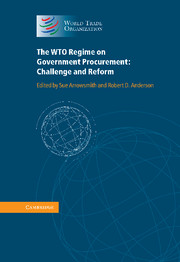Book contents
- Frontmatter
- Contents
- List of contributors
- Foreword by Pascal Lamy
- Perspective of the Chairman of the WTO Committee on Government Procurement, Nicholas Niggli (Switzerland)
- Preface
- Disclaimer
- PART I The WTO regime on government procurement
- PART II Expanding the scope of the Agreement on Government Procurement: accession and coverage
- PART III Revision of the procedural rules and other transparency provisions of the Agreement on Government Procurement
- PART IV Developing countries in the WTO procurement regime
- PART V Economic and social development (horizontal policies) in government procurement
- PART VI Enforcement and remedies
- PART VII Multilateralism and regionalism
- 20 Government procurement provisions in regional trade agreements: a stepping stone to GPA accession?
- 21 A case study of regionalism: the EC–CARIFORUM Economic Partnership
- PART VIII Challenges and new directions
- Index
21 - A case study of regionalism: the EC–CARIFORUM Economic Partnership
from PART VII - Multilateralism and regionalism
Published online by Cambridge University Press: 07 September 2011
- Frontmatter
- Contents
- List of contributors
- Foreword by Pascal Lamy
- Perspective of the Chairman of the WTO Committee on Government Procurement, Nicholas Niggli (Switzerland)
- Preface
- Disclaimer
- PART I The WTO regime on government procurement
- PART II Expanding the scope of the Agreement on Government Procurement: accession and coverage
- PART III Revision of the procedural rules and other transparency provisions of the Agreement on Government Procurement
- PART IV Developing countries in the WTO procurement regime
- PART V Economic and social development (horizontal policies) in government procurement
- PART VI Enforcement and remedies
- PART VII Multilateralism and regionalism
- 20 Government procurement provisions in regional trade agreements: a stepping stone to GPA accession?
- 21 A case study of regionalism: the EC–CARIFORUM Economic Partnership
- PART VIII Challenges and new directions
- Index
Summary
Introduction
The EC–CARIFORUM Economic Partnership Agreement was the first full Economic Partnership Agreement (EPA) to be negotiated and signed between the EC and an African, Caribbean and Pacific (ACP) region, as required by the terms of the Cotonou Agreement of 2000. It is also the only EPA under negotiation to dedicate a chapter to the regulation of government procurement policies. As such it stands not only as a reference point for other ACP countries' EPA negotiations and other north–south regional trading agreements (RTAs), but it might also offer some insight into the perceived role of government procurement regulation in developing countries' trade agreements with developed countries.
This chapter compares the EC–CARIFORUM government procurement provisions with other RTAs and the WTO's Agreement on Government Procurement (GPA). In particular, it examines the transparency and non-discrimination requirements, the thresholds and coverage, and bid challenge mechanisms. The strengths and weaknesses of the EC–CARIFORUM EPA procurement provisions are assessed in the context of broader development policies. In conducting this analysis, the role of and rhetoric concerning the ‘policy space’ debate are also discussed with reference to government procurement reform. The chapter contends that demands for policy space to avoid hegemonic ‘one-size-fits-all’ policies are potentially misleading. They serve to detract attention away from the need to push through reforms based on international norms in this area; as well as the flexibilities that already exist in trade agreements.
- Type
- Chapter
- Information
- The WTO Regime on Government ProcurementChallenge and Reform, pp. 657 - 678Publisher: Cambridge University PressPrint publication year: 2011

